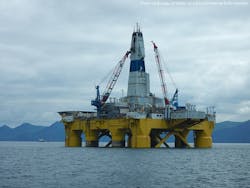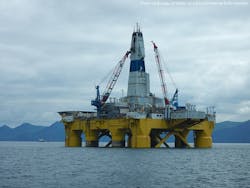Shell exits Arctic after ‘disappointing exploration outcome’
Royal Dutch Shell PLC encountered oil and gas shows in its Burger J exploration well in Alaska’s Chukchi Sea, but the results weren’t “sufficient to warrant further exploration,” the company reported on Sept. 28.
Shell says it will now halt further exploration activity offshore Alaska for the foreseeable future, a decision reflecting “the Burger J well result, the high costs associated with the project, and the challenging and unpredictable federal regulatory environment in offshore Alaska.”
Operations will continue to demobilize people and equipment from the Chukchi Sea, Shell says.
The company, which had allotted $7 billion for the multiyear program, expects to take financial charges as a result of the decision. The balance sheet carrying value of Shell’s Alaska position is $3 billion, with an additional $1.1 billion of future contractual commitments.
“Shell continues to see important exploration potential in the basin, and the area is likely to ultimately be of strategic importance to Alaska and the US,” explained Marvin Odum, director of Shell Upstream Americas. “However, this is a clearly disappointing exploration outcome for this part of the basin.”
The company noted in a news release, “For an area equivalent to half the size of the Gulf of Mexico, this basin remains substantially underexplored,” and “demonstrates many of the key attributes of a major petroleum basin.”
The Burger J well is 150 miles from Barrow, Alas., in 150 ft of water. A sequence of regulatory hurdles finally concluded in August when the company received permission from the US Bureau of Safety and Environment Enforcement to drill the well to total depth (OGJ Online, Aug. 17, 2015). It was drilled to 6,800 ft.
Shell has held 100% working interest in 275 Outer Continental Shelf blocks in the Chukchi Sea since submitting $2.12 billion in high bids during the 2008 Chukchi Sea lease sale (OGJ Online, Feb. 7, 2008).
During the company’s 2012 Chukchi drilling campaign, the Kulluk conical drilling unit was driven aground by violent weather on Alaska’s uninhabited Sitkalidak Island while under tow to Seattle (OGJ Online, Feb. 13, 2013).
Many ‘underlying reasons’
“The exit today of Royal Dutch Shell from the US Arctic and Alaska is deep with a lot of underlying reasons,” noted said Carl Larry, oil and gas director atconsulting firmFrost & Sullivan. “We may only hear the standard line that ‘they couldn’t find enough oil and gas,’ but there’s more to this if we look inside the move.”
He first mentioned that the move “reinforces the idea that conventional drilling is fading fast and nonconventional is not going to fall by the wayside.” Investment in conventional drilling is waning in not only the US but around the world, Larry said, and Shell’s projects “in other areas of the world may also be dragging down their capital.
“In areas such as the North Sea and Nigeria, we have production that remains viable, but at a loss to find consumers.” Larry attributes the drop in consumers to a decline in oil exports to the US, where the country has seen a dramatic upward shift in its own oil output.
“America was once the largest consumer of said areas, but has since dropped Nigerian crude imports to about [50,000] b/d this year,” he said. “That alone is a significant decline from 2012 when Nigeria was supplying the US with over 1 [million] b/d.”
Another shift in the import-export picture comes by way of US refinery utilization and production, which have hit record levels this year. “America once was a major gasoline importer, mainly from Europe, and now has cut that number in half from peaks seen prior to 2011,” Larry explained.
“The business about production in Alaska and the Arctic has always been a political hotbed,” he added. “As we head into the 2016 presidential elections, Keystone may not be the only oil-related argument on the table.”
Larry said, “We can also see more US producers angling for support of more restrictions in the Arctic as well as against Keystone [XL]. Shale producers want to keep the shale oil as the viable choice for investment and growth,” he asserted. “The idea that Shell is leaving America’s Arctic lands may be only one of the first that will have to look elsewhere to find profitable oil drilling.”
Contact Matt Zborowski at [email protected].

